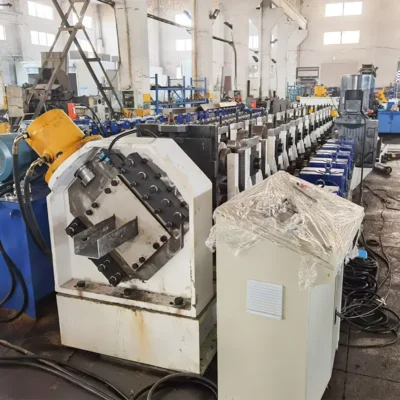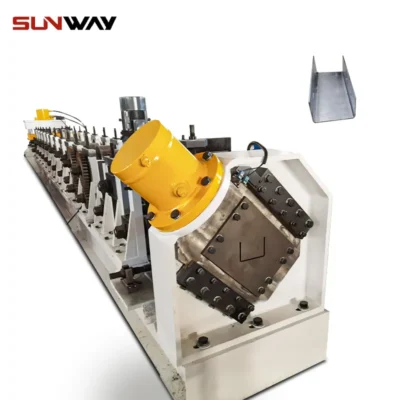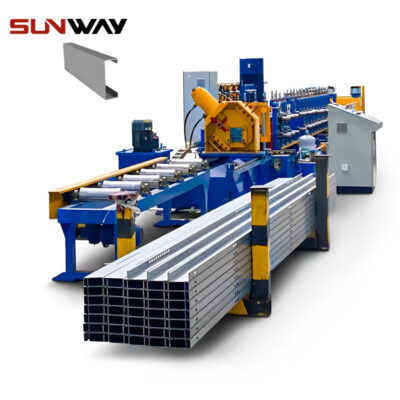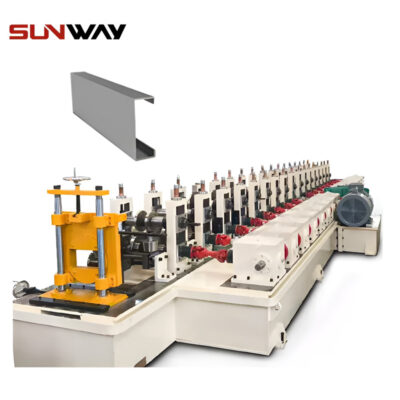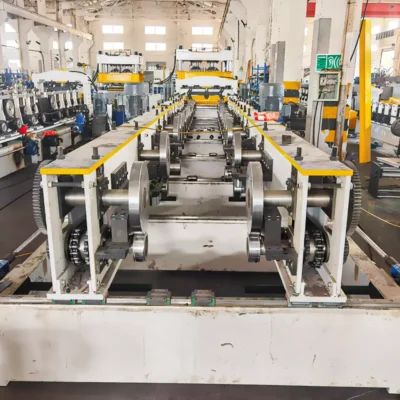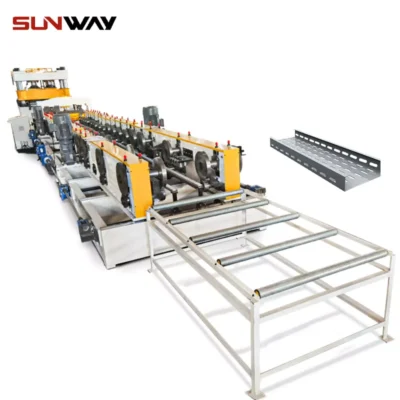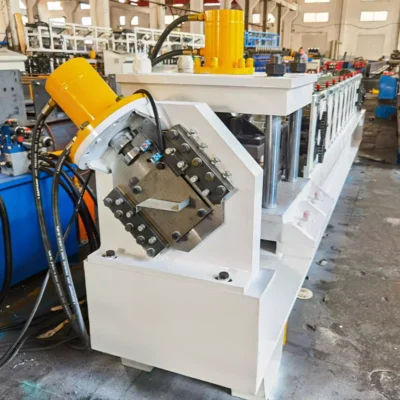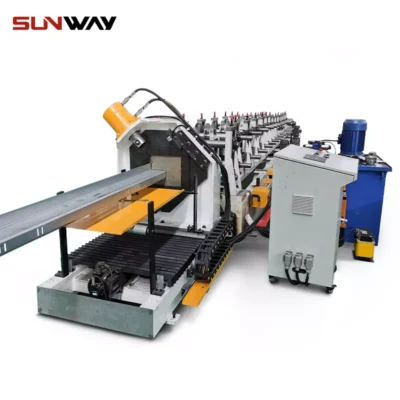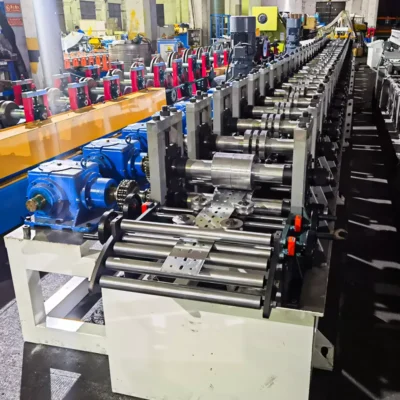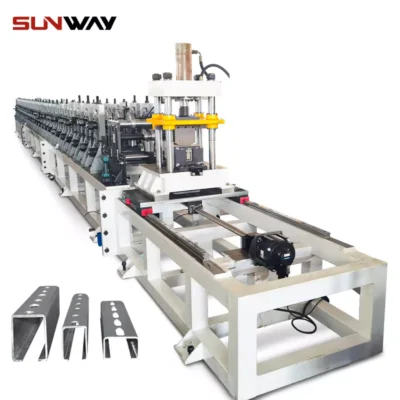The renewable energy industry is booming, with solar power leading the charge. At the heart of every solar power system lies the inverter—a critical component that converts direct current (DC) from solar panels into alternating current (AC) for use in homes and businesses. To protect these sensitive and essential devices, durable and precisely engineered enclosures are required. This is where Solar Inverter Enclosure Roll Forming Machines step in, revolutionizing the manufacturing process by providing high-speed, accurate, and efficient production of solar inverter housings.
In this comprehensive guide, we’ll explore the features, benefits, applications, and industry trends surrounding Solar Inverter Enclosure Roll Forming Machines. We’ll also spotlight Wuxi Sunway Machinery, a global leader in roll-forming technology, and how their solutions are propelling renewable energy manufacturing into the future. If you’re in the renewable energy, HVAC, or manufacturing sector, this guide will show why these machines are indispensable in 2025.
What are Solar Inverter Enclosure Roll Forming Machines?
A Solar Inverter Enclosure Roll Forming Machine is a specialized industrial machine designed to manufacture the metal enclosures that house solar inverters. These enclosures are vital for protecting inverters from external elements such as heat, dust, and moisture, ensuring their long-term performance in diverse environmental conditions.
The roll-forming process involves feeding metal coils through a series of rollers that gradually shape the material into precise enclosure profiles. These machines allow manufacturers to produce durable, weather-resistant, and aesthetically pleasing enclosures in high volumes, making them an essential tool for the renewable energy industry.
Applications of Solar Inverter Enclosure Roll Forming Machines
The components produced by Solar Inverter Enclosure Roll Forming Machines serve a variety of applications, primarily within the renewable energy and manufacturing sectors. Here’s where they’re most commonly used:
1. Residential Solar Power Systems
- Use Case: Enclosures for rooftop solar inverters in homes.
- Why It Matters: High-quality enclosures ensure the safety and longevity of inverters in residential installations, even under harsh weather conditions.
2. Commercial Solar Projects
- Use Case: Enclosures for solar inverters in office buildings, shopping malls, and educational institutions.
- Why It Matters: Durable and scalable inverter housings meet the demands of high-capacity solar systems in commercial settings.
3. Industrial Solar Installations
- Use Case: Large-scale solar farms and industrial facilities require robust enclosures for heavy-duty solar inverters.
- Why It Matters: Corrosion-resistant and weatherproof enclosures protect critical components in extreme environments.
4. Off-Grid Solar Systems
- Use Case: Enclosures for standalone solar inverters in remote locations, such as rural villages or disaster recovery sites.
- Why It’s Crucial: Reliable protection ensures uninterrupted power supply in off-grid and isolated setups.
5. Hybrid Energy Systems
- Use Case: Enclosures for inverters in hybrid systems that combine solar, wind, and battery storage.
- Why It Matters: Roll-formed profiles allow for custom designs that accommodate hybrid configurations.
6. Electric Vehicle Charging Stations
- Use Case: Solar-powered EV charging stations require inverter enclosures to manage energy conversion and distribution.
- Why It’s Exciting: As EV adoption grows, so does the demand for precise and scalable inverter enclosures.
Key Features of Wuxi Sunway Solar Inverter Enclosure Roll Forming Machines
Wuxi Sunway Machinery is at the forefront of roll-forming technology, offering advanced machines designed specifically for manufacturing solar inverter enclosures. Here’s what sets their machines apart:
1. Customizable Profile Production
- What It Offers: Machines can produce a wide range of profiles, including custom sizes and shapes for different inverter designs.
- Why It’s Revolutionary: Supports manufacturers in creating enclosures tailored to specific customer needs.
2. Material Versatility
- Supported Materials:
- Galvanized steel
- Stainless steel
- Aluminum alloys
- Pre-coated and powder-coated metals
- Why It Matters: Enables manufacturers to produce lightweight, corrosion-resistant, and durable enclosures.
3. High Precision and Tolerance
- What It Does: Ensures enclosures are manufactured with precise dimensions and smooth finishes.
- Why It’s Important: Guarantees seamless assembly and optimal protection for inverters.
4. Integrated Punching and Cutting Systems
- What It Includes: Machines feature integrated systems for creating holes, slots, and cutouts for wiring and ventilation.
- Why It’s Crucial: Reduces the need for additional processing steps, streamlining production.
5. High-Speed Production
- Performance: Machines can produce up to 25 meters of profiles per minute, depending on the design.
- Why It Matters: Meets the high-volume demands of solar equipment manufacturers.
6. Fully Automated Operations
- Features:
- PLC-controlled systems with an intuitive interface.
- Real-time monitoring for error detection.
- Automated stacking and packaging systems.
- Why It’s Revolutionary: Reduces labor requirements while ensuring consistent quality across all products.
7. Energy-Efficient Design
- What It Offers: Machines are equipped with energy-saving motors and optimized power distribution systems.
- Why It Matters: Aligns with the renewable energy industry’s sustainability goals.
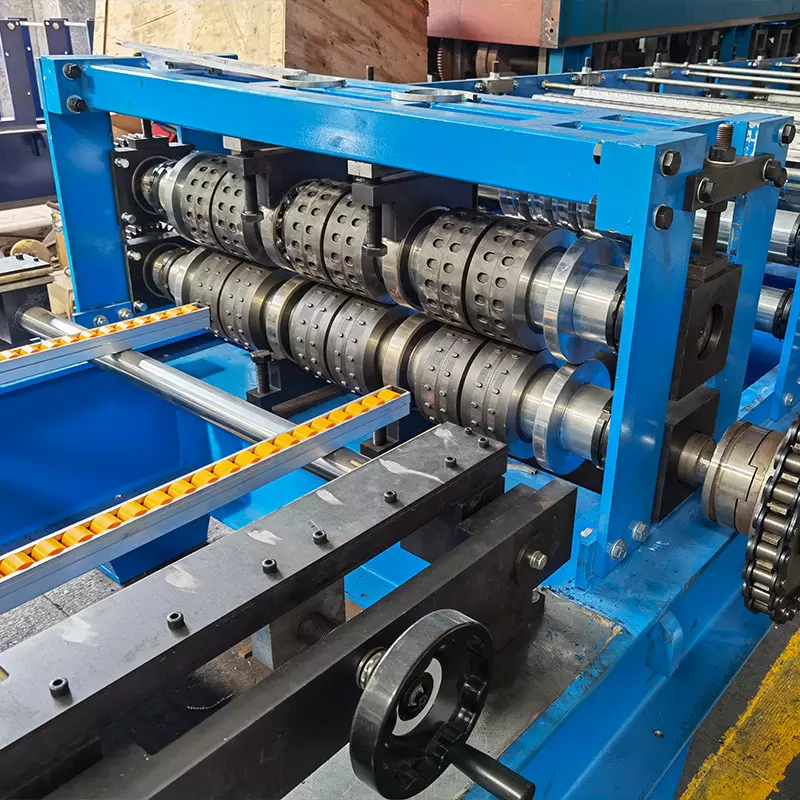
Production Workflow of a Solar Inverter Enclosure Roll Forming Machine
Here’s an overview of the production process for solar inverter enclosures:
1. Decoiling
- Raw metal coils are loaded onto the decoiler, which feeds the material into the machine.
2. Leveling
- A leveling system ensures the material is flat and free from defects before entering the roll-forming section.
3. Roll Forming
- The material passes through a series of rollers that gradually shape it into the desired enclosure profile.
4. Punching and Cutting
- Integrated punching systems create holes and slots for wiring, ventilation, and mounting, while cutting units trim profiles to the required dimensions.
5. Surface Finishing (Optional)
- Additional treatments, such as powder coating or anodizing, can be applied to enhance durability and aesthetics.
6. Stacking and Packaging
- Finished profiles are automatically stacked and packaged for easy transportation and assembly.
Pricing of Solar Inverter Enclosure Roll Forming Machines
The cost of a Solar Inverter Enclosure Roll Forming Machine varies based on its features, automation level, and production capacity. Below is a general pricing guide for 2025:
| Machine Type | Capabilities | Price Range (USD) |
|---|---|---|
| Standard Machines | Basic enclosure production | $180,000–$300,000 |
| Advanced Machines | High-precision and multi-profile output | $300,000–$500,000 |
| Fully Customizable Machines | Multi-material compatibility and custom features | $500,000–$800,000 |
For detailed pricing and financing options, contact Wuxi Sunway Machinery.
Advantages of Using Solar Inverter Enclosure Roll Forming Machines
Investing in a Solar Inverter Enclosure Roll Forming Machine offers significant benefits for manufacturers:
1. Enhanced Efficiency
- High-speed production reduces lead times and increases overall output.
2. Precision and Consistency
- Ensures uniform quality across all enclosures, minimizing assembly issues.
3. Material Flexibility
- Supports a wide range of materials, including corrosion-resistant options.
4. Cost Savings
- Reduces material waste and labor costs, improving profitability.
5. Scalability
- Suitable for both small-scale manufacturers and large-scale production lines.
FAQs About Solar Inverter Enclosure Roll Forming Machines
| Question | Answer |
|---|---|
| Can the machine handle stainless steel? | Yes, it is designed to process stainless steel and other durable materials. |
| What is the typical production speed? | Machines can produce up to 25 meters of profiles per minute. |
| Does Wuxi Sunway provide after-sales support? | Absolutely! Comprehensive after-sales support, including maintenance and troubleshooting, is provided. |
| Are custom profiles supported? | Yes, the machine can produce custom profiles tailored to specific inverter designs. |
| What is the machine’s expected lifespan? | With proper maintenance, the machine can last 10–15 years or longer. |
Global Trends Driving the Adoption of Solar Inverter Enclosure Roll Forming Machines
The adoption of Solar Inverter Enclosure Roll Forming Machines is being driven by several global trends in the renewable energy and manufacturing industries. Let’s take a closer look at these trends:
1. Growth of the Global Solar Market
- The Numbers: The global solar energy market is expected to reach a value of $400 billion by 2030, growing at a CAGR of 6.9%.
- Impact on Solar Inverters: As solar installations increase, so does the demand for durable and reliable inverter enclosures.
- Why It Matters: Roll-forming machines enable manufacturers to meet this growing demand with scalable, high-speed production.
2. Shift Toward Net-Zero Emissions
- The Push: Governments and organizations worldwide are committing to net-zero emissions by 2050.
- Impact on Solar Inverters: Solar power systems are a cornerstone of these efforts, requiring robust and eco-friendly components.
- Why It’s Relevant: Roll-forming machines support sustainable manufacturing practices by minimizing waste and enabling the use of recyclable materials.
3. Rising Demand for Customization
- The Trend: Solar installations are becoming more diverse, with unique requirements for residential, commercial, and industrial projects.
- Impact on Solar Inverters: Manufacturers need the flexibility to produce custom-sized enclosures for different inverter models.
- Why It’s Crucial: Modern roll-forming machines, like those from Wuxi Sunway, offer customizable tooling systems for tailored production.
4. Focus on Durability and Weather Resistance
- The Challenge: Solar inverters are often installed outdoors, where they face exposure to extreme weather, UV radiation, and corrosion.
- Impact on Inverter Enclosures: Enclosures must be built to withstand these harsh conditions without compromising performance.
- Why It’s Exciting: Roll-forming machines enable the production of high-strength, weatherproof profiles that meet these demands.
5. Expansion of Electric Vehicle (EV) Infrastructure
- The Opportunity: Solar-powered EV charging stations are becoming a key component of the renewable energy ecosystem.
- Impact on Solar Inverters: These stations require specialized inverter enclosures that integrate seamlessly with charging infrastructure.
- Why It’s Important: Roll-forming technology supports the efficient production of these custom enclosures.
6. Advancements in Smart Energy Systems
- The Shift: Smart energy systems are integrating solar, wind, and battery storage for optimized energy management.
- Impact on Solar Inverters: Enclosures need to accommodate advanced features like IoT connectivity and thermal management.
- Why It’s Revolutionary: Roll-forming machines can produce enclosures with precise cutouts and features for smart systems.
Technological Advancements in Solar Inverter Enclosure Roll Forming Machines
The evolution of Solar Inverter Enclosure Roll Forming Machines is being driven by cutting-edge technologies that enhance efficiency, precision, and sustainability. Let’s explore these advancements:
1. AI-Driven Quality Control
- What It Does: Artificial intelligence monitors production parameters, detects defects, and adjusts machine settings in real-time.
- Benefits:
- Guarantees consistent quality for all profiles.
- Reduces material waste and downtime.
- Improves overall production efficiency.
2. IoT Integration for Smart Manufacturing
- How It Works: IoT sensors collect real-time data on machine performance, material usage, and output quality.
- Advantages:
- Enables remote monitoring and predictive maintenance.
- Reduces unplanned downtime and boosts productivity.
- Supports seamless integration into smart factory ecosystems.
3. Multi-Material Compatibility
- The Innovation: Modern machines can process a variety of materials, including galvanized steel, aluminum, and stainless steel.
- Why It’s Revolutionary:
- Expands the range of applications for solar inverter enclosures.
- Supports the production of lightweight yet durable components.
- Meets the specific needs of different markets and industries.
4. Advanced Cutting and Punching Systems
- What It Includes: High-precision systems for creating holes, slots, and ventilation cutouts.
- Why It’s Crucial:
- Simplifies post-production assembly.
- Enhances the functionality of enclosures for smart energy systems.
- Reduces the need for additional machining.
5. Energy-Efficient Design
- What It Offers: Energy-saving motors, optimized power distribution, and regenerative braking systems.
- Why It Matters:
- Lowers electricity consumption and operational costs.
- Aligns with sustainability goals in renewable energy manufacturing.
- Improves the overall profitability of production lines.
6. Modular Tooling Systems
- What It Enables: Quick transitions between different profile designs and sizes.
- Why It’s Important:
- Enhances flexibility for manufacturers serving diverse markets.
- Reduces downtime during tooling changes.
- Supports the production of custom enclosures.
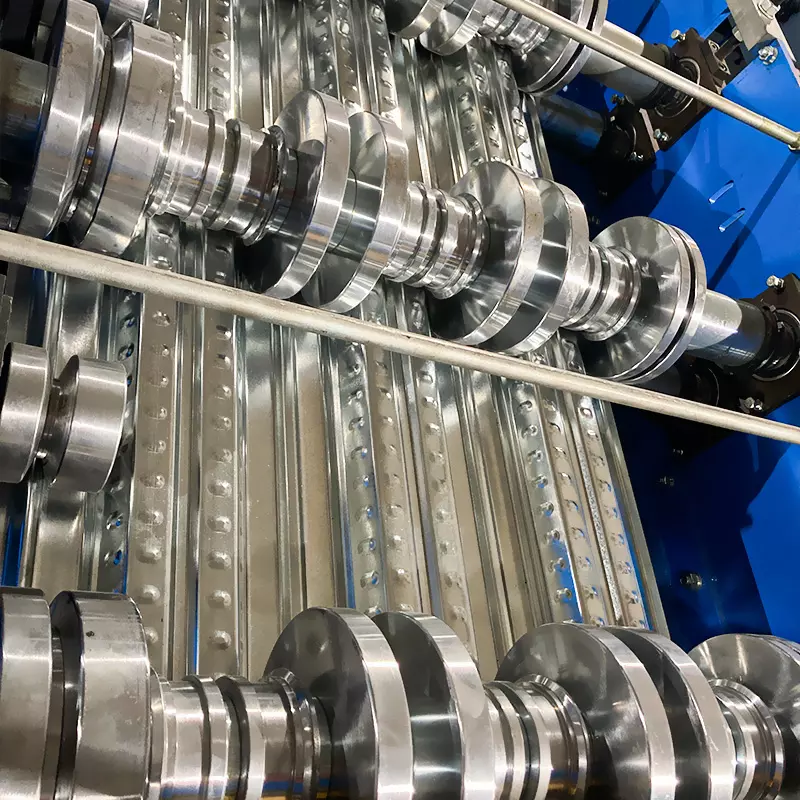
Environmental Impact of Solar Inverter Enclosure Roll Forming Machines
Sustainability is a core focus in the manufacturing industry, and Solar Inverter Enclosure Roll Forming Machines contribute significantly to eco-friendly practices. Here’s how:
1. Reduced Material Waste
- How It Works: The roll-forming process shapes metal with high precision, minimizing scrap and offcuts.
- Impact:
- Conserves raw materials, reducing environmental impact.
- Lowers production costs for manufacturers.
2. Use of Recyclable Materials
- What It Supports: Machines can process recyclable materials like aluminum and galvanized steel.
- Why It Matters:
- Promotes a circular economy by enabling material reuse.
- Reduces landfill waste and supports green energy initiatives.
3. Energy Efficiency
- The Innovation: Modern machines consume less energy while maintaining high production speeds.
- Why It’s Crucial:
- Helps manufacturers reduce their carbon footprint.
- Aligns with global sustainability goals, such as net-zero emissions.
- Improves overall operational efficiency.
4. Localization of Production
- What It Enables: Manufacturers can produce solar inverter enclosures locally, reducing the need for long-distance transportation.
- Outcome:
- Cuts down on emissions associated with shipping.
- Enhances supply chain reliability and regional sustainability.
FAQs About Solar Inverter Enclosure Roll Forming Machines
| Question | Answer |
|---|---|
| What materials can the machine process? | It supports galvanized steel, stainless steel, aluminum, and pre-coated metals. |
| What is the machine’s production capacity? | Machines can produce up to 25 meters of profiles per minute, depending on the design. |
| Does Wuxi Sunway provide operator training? | Yes, comprehensive training is included with every machine purchase. |
| Are financing options available? | Yes, flexible financing options are offered to qualified buyers. |
| Can the machine produce custom enclosures? | Absolutely! The machine is designed to support custom profiles and sizes. |
| What is the typical maintenance schedule? | Routine maintenance includes lubrication, inspection of rollers, and calibration of tooling systems. |
Why Choose Wuxi Sunway Machinery for Solar Inverter Enclosure Roll Forming Machines?
Here’s why Wuxi Sunway Machinery is a trusted partner for solar inverter enclosure manufacturers worldwide:
- Expertise in Renewable Energy: Decades of experience in delivering innovative roll-forming solutions tailored for the renewable energy sector.
- Global Reach: Trusted by clients in Asia, Europe, the Americas, and beyond.
- Customization Excellence: Machines tailored to meet specific solar inverter enclosure designs and material requirements.
- Sustainability Leadership: Eco-friendly designs that minimize waste and reduce energy consumption.
- Advanced Technology: Features like IoT integration, AI-driven quality control, and energy-efficient systems.
- Comprehensive Support: From installation to after-sales service, Sunway ensures seamless and efficient operations.
Conclusion: Powering the Future of Renewable Energy Manufacturing
The Solar Inverter Enclosure Roll Forming Machine is revolutionizing the renewable energy sector by enabling the efficient production of durable, weatherproof, and customizable enclosures. Whether you’re manufacturing for residential solar systems, industrial installations, or hybrid energy setups, these machines provide the precision, scalability, and innovation needed to thrive in 2025 and beyond.
If you’re ready to take your manufacturing operations to the next level, contact Wuxi Sunway Machinery today. Together, let’s power the future of renewable energy—one enclosure at a time!

